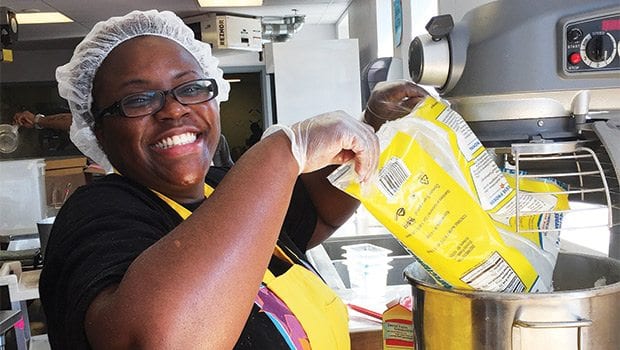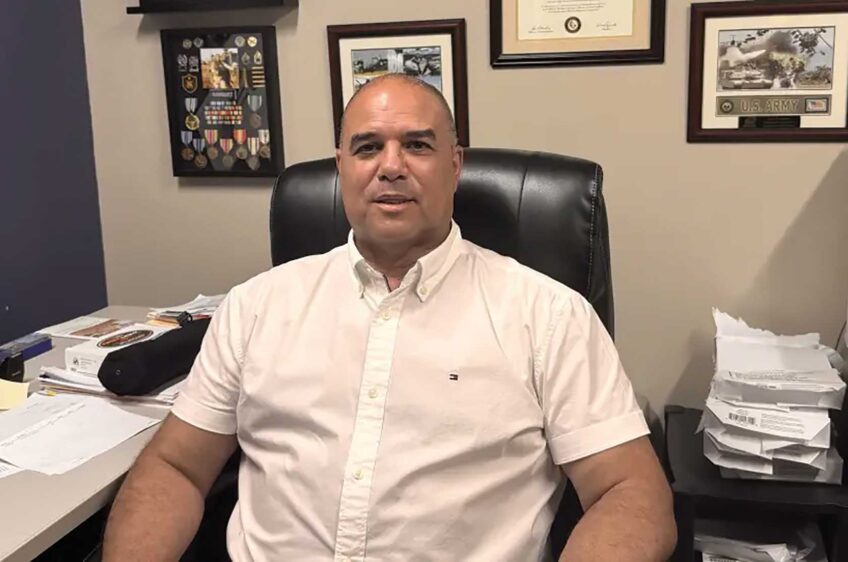Santander Bank’s new program focuses on entrepreneurs in low-wealth communities in Boston

Some thirty Boston food industry entrepreneurs will have an opportunity this fall to participate in a new pilot program that aims to provide an extra dose of education, support and assistance to help early-stage small businesses thrive.

Author: Photo: Courtesy of CommonWealth KitchenThe team at Deborah’s kitchen makes jam.
Santander Bank this week announced “Cultivate Small Business,” a pilot initiative designed to assist women-, minority- and immigrant-owned businesses in food-related industries. The program’s focus is on helping to fill gaps in networking, mentorship, training and access to capital in order to smooth the path to business success, a path that can be particularly rocky for entrepreneurs starting out with few resources.
“This new program offers comprehensive support,” said Gwen Robinson, Santander’s Managing Director of Corporate Social Responsibility, “where the small business owners come from low-wealth backgrounds or lack access to mentors, networks and capital.”
The lead partner with Santander is the Initiative for a Competitive Inner City (ICIC), which has been coordinating the pilot program design and will manage the application process, coordinate networking support and conduct an evaluation. Partner Babson College will develop and adapt a small-business curriculum to be offered on campus and online, and CommonWealth Kitchen, the Dorchester-based food business incubator, will provide training and technical assistance. Santander will furnish small capital grants and provide bank volunteers to serve as mentors.

Author: Photo: Courtesy of CommonWealth KitchenThe Jamaica Mi Hungry team with their mobile kitchen.
An online application process will open in June, but interested people can access a copy by sending an email to entrepreneurs@santander.us. Applicants must live in or represent a food-related business in a low- to moderate-income neighborhood in Greater Boston. The business must have been in operation for at least one year and have earned between $25,000 and $1 million in revenue in the most recent full calendar year or otherwise demonstrate readiness to participate. The focus will be on businesses with one to 10 employees. Applicants will be notified in September if they have been selected for the program.
Once selected, the cohort of approximately 30 entrepreneurs will engage in a nine-month part-time program running from October to June. After completion, they will be part of an alumni network lending mutual support as they put their learning into action.
Part of the inspiration for the small business program, Robinson said, was a 2015 report from the Federal Reserve Bank of Boston that illuminated the widening local wealth gap between nonwhites and whites. “The Color of Wealth in Boston” revealed vast racial and ethnic disparities in income, wealth, home ownership and debt burdens, with Boston’s nonwhite households showing a tiny fraction of the net worth of the median white household.
Among the many barriers that come along with lower income and wealth are greater difficulty in saving for retirement or helping the next generation rise out of poverty, and a steeper road to gaining the capital necessary to start and sustain a business. The report called for policies to spur asset development in low-income communities.
“[Santander] thought this was a good way to look at wealth building — building a business, and building wealth through ownership,” Robinson said. She said while other programs work with larger businesses, the bank and its partners wanted to zero in on smaller businesses that could make an impact at the community level and beyond.
“There’s so much growth going on here in Boston, but we want to make sure that small businesses starting without a lot of money, or coming from low income communities, are able to participate in the growth of the regional economy,” she said.

Author: Photo: Courtesy Santander BankGwen Robinson
CommonWealth Kitchen Executive Director Jen Faigel helped tailor the program curriculum to suit small businesses centered around food production or other food-related services and products.
“We’re really excited about this approach, because it’s working with smaller businesses earlier in their process,” Faigel said of the new initiative. Her organization will help to recruit food business owners to apply to the Cultivate Small Business program and will be active in the technical assistance and mentoring pieces.
“I think the approach makes sense from a wealth-building perspective,” Faigel said. “In many cases the business owner is creating their own job — so this is a way to create more full-time work, rather than having people out there working part time in the ‘gig economy.’ The food industry is a tough business, but this will help build more small businesses rather than large companies that might create minimum-wage jobs.”
Santander’s Robinson sees the initiative as a two-way street in terms of education.
“We think it’s going to be a great opportunity for business operators to learn and grow, but also for financial institutions to learn what’s really helpful for small businesses.”






